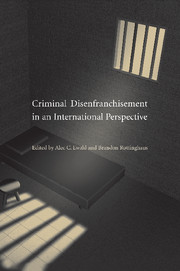Book contents
- Frontmatter
- Contents
- Contributors
- Foreword: Waves of Democracy and Criminal Disenfranchisement
- Acknowledgments
- Introduction
- Part I CONTEMPORARY DISENFRANCHISEMENT LAW
- 1 Voting Rights and Human Rights: A Comparative Analysis of Criminal Disenfranchisement Laws
- 2 Punishment and Social Exclusion: National Differences in Prisoner Disenfranchisement
- Part II DISENFRANCHISEMENT IN COMPARATIVE PERSPECTIVE: LEGAL AND POLITICAL APPROACHES
- Part III VOTING RIGHTS AND PEOPLE WITH CRIMINAL CONVICTIONS: CASE STUDIES
- Index
- References
2 - Punishment and Social Exclusion: National Differences in Prisoner Disenfranchisement
Published online by Cambridge University Press: 03 July 2009
- Frontmatter
- Contents
- Contributors
- Foreword: Waves of Democracy and Criminal Disenfranchisement
- Acknowledgments
- Introduction
- Part I CONTEMPORARY DISENFRANCHISEMENT LAW
- 1 Voting Rights and Human Rights: A Comparative Analysis of Criminal Disenfranchisement Laws
- 2 Punishment and Social Exclusion: National Differences in Prisoner Disenfranchisement
- Part II DISENFRANCHISEMENT IN COMPARATIVE PERSPECTIVE: LEGAL AND POLITICAL APPROACHES
- Part III VOTING RIGHTS AND PEOPLE WITH CRIMINAL CONVICTIONS: CASE STUDIES
- Index
- References
Summary
As Sidney Verba and colleagues have noted, “casting a ballot is, by far, the most common act of citizenship in any democracy.” Although universal suffrage represents the democratic ideal, many nations have historically withheld the franchise from women and racial and ethnic minority groups. Even with the gradual incorporation of these groups, however, restrictions on prisoners have persisted. This chapter considers some of the sources of national variation in prisoner disenfranchisement policies. We ask a simple, macro-level question: To what extent are felon voting practices associated with national characteristics such as economic development, democratization, ethnic conflict, and punitiveness? We consider the relationship between each of these characteristics and prisoner disenfranchisement for a broad group of 105 nations, as well as a smaller subsample of 39 European nations. Consistent with expectations, we find prisoner disenfranchisement to be concentrated in less democratized nations with high incarceration rates and low levels of economic development. We consider the implications of these findings for democratic theories of citizenship and criminological theories of prisoner reintegration.
Extant research suggests dramatic variation in the extent to which nations disenfranchise prisoners. International voting rights for prisoners essentially fall along a continuum. Some nations, such as Canada, Denmark, and South Africa, allow inmates to vote while in prison. Other countries, such as Egypt and the United Kingdom, ban all prisoners from voting. In between those extremes are countries that allow prisoners to vote under certain conditions, such as Australia, Belgium, and Japan.
- Type
- Chapter
- Information
- Publisher: Cambridge University PressPrint publication year: 2009
References
- 4
- Cited by



